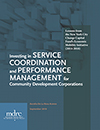Investing in Service Coordination and Performance Management for Community Development Corporations
Lessons from the New York City Change Capital Fund’s Economic Mobility Initiative (2014-2018)

 The New York City Change Capital Fund (CCF) is a donor collaborative whose 2014-2018 economic mobility initiative supported the dual efforts of community development corporations to integrate housing, education, and employment services and to improve those services through the use of data. By investing in building the grantees’ data capacity, CCF helped their organizations move beyond simply tracking the services that participants receive to analyzing their data and making adjustments to increase program effectiveness. This final report on the initiative offers insights to policymakers, funders, and practitioners who may participate in similar initiatives in the future — including CCF’s next round of grantees, who launched their efforts in summer 2018.
The New York City Change Capital Fund (CCF) is a donor collaborative whose 2014-2018 economic mobility initiative supported the dual efforts of community development corporations to integrate housing, education, and employment services and to improve those services through the use of data. By investing in building the grantees’ data capacity, CCF helped their organizations move beyond simply tracking the services that participants receive to analyzing their data and making adjustments to increase program effectiveness. This final report on the initiative offers insights to policymakers, funders, and practitioners who may participate in similar initiatives in the future — including CCF’s next round of grantees, who launched their efforts in summer 2018.
Key Lessons
-
A donor collaborative is particularly well equipped to take on a capacity-building initiative. By pooling their funds, CCF donors were able to provide flexible, multiyear funding to support community development corporations’ capacity-building efforts, which may be beyond the funding capability of a single donor. Unlike most philanthropic funding, which requires organizations to continually apply for grants, the multiyear cycles typically favored by donor collaboratives allow grantees to plan their work within a known budget for an extended period of time, focus on implementing their plans, and pursue new funds when their efforts are further along.
-
Dedicated funding paired with individualized technical assistance helps grantees build their data capacity. Funders rarely support grantees’ performance management efforts, even though they are increasingly interested in data analyses that can demonstrate how a grantee is performing. CCF’s funding provided a unique opportunity for each grantee to invest in a management information system that integrates data from programs across its organization, and to hire and retain staff members experienced in using that data to evaluate effectiveness. An important lesson from CCF is that each grantee benefits most from technical assistance when it is customized to the organization’s current data capacity and goals for growth. All the grantees were able to increase their data capacity over the course of the initiative.
-
Investments in data capacity supported grantees’ efforts to improve service coordination. Current funding to community development corporations largely remains aimed at individual programs or services, resulting in programs working in separate “silos,” but CCF’s initiative shows that investing in a grantee’s service coordination can make a real difference in the way the staff operates. The funding and technical assistance provided by the donor collaborative emphasized improving each organization’s ability to track its participants’ interactions with multiple programs and better understand the extent of its cross-program efforts.
- Government stakeholders should be engaged from the start. The New York City Mayor’s Office for Economic Opportunity (NYC Opportunity) was involved as an adviser to CCF from the beginning of the initiative and later joined the collaborative as a funder to connect the lessons of CCF to citywide policies and practices. NYC Opportunity provided a city government perspective and brokered relationships between the participants in the CCF initiative and city agencies and officials.







